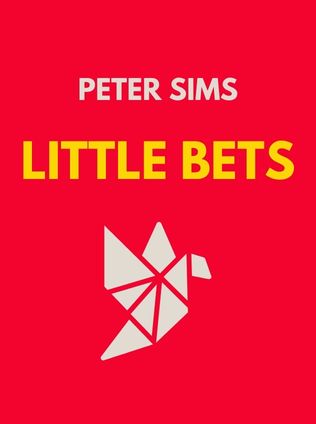
Little Bets
How Breakthrough Ideas Emerge from Small Discoveries
By Peter Sims
Published 07/2013
About the Author
Peter Sims is a renowned author and entrepreneur with a keen interest in innovation and leadership. He co-authored the best-selling book "True North" with Bill George, which explores authentic leadership. Sims has been featured in prestigious publications such as the Harvard Business Review, Fortune, and TechCrunch. His work often focuses on the processes that lead to creativity and success in various fields. In "Little Bets: How Breakthrough Ideas Emerge from Small Discoveries," Sims offers a fresh perspective on innovation, emphasizing the power of small, experimental steps over grandiose plans.
Main Idea
The core thesis of "Little Bets" revolves around the idea that breakthrough innovations and creative solutions often arise from small, incremental experiments rather than from large-scale, preconceived plans. Sims argues that by taking "little bets"—small, low-risk actions to explore and test ideas—individuals and organizations can learn, adapt, and ultimately discover successful strategies. This method contrasts sharply with traditional approaches that prioritize big, bold moves and meticulous planning.
Sims draws on examples from various industries and disciplines, showcasing how figures like Steve Jobs, comedian Chris Rock, and architect Frank Gehry have used little bets to achieve extraordinary outcomes. By embracing failure as a critical learning tool, engaging in playful experimentation, and iterating on ideas, these innovators have been able to navigate uncertainty and unlock creative potential.
Table of Contents
- Introduction
- The Power of Small Bets
- Failing Quickly to Learn Fast
- Play: The Importance of a Playful Mindset
- Immerse: Gathering Insights from the World
- Define: Identifying and Understanding Problems
- Reorient: Flexibility in Pursuit of Goals
- Iterate: The Cycle of Experimentation
- Big Bets vs. Little Bets
- The Growth Mindset
- Prototyping and the Genius of Play
- Smallifying Problems
- Questions are the New Answers
- Learning from Active Users
- Small Wins and Their Importance
- Conclusion: The Path to Innovation
The Power of Small Bets
Sims introduces the concept of "little bets" by highlighting how small, exploratory actions can lead to significant discoveries. He argues that in an unpredictable world, making small bets allows individuals and organizations to test ideas with minimal risk. This approach encourages experimentation and learning from failure, which is essential for creative growth.
For example, Steve Jobs and the team at Apple did not start with the goal of creating revolutionary products like the iPhone or iPad. Instead, they began with small, incremental steps, experimenting with different technologies and designs. This iterative process allowed them to refine their ideas and eventually bring groundbreaking products to market.
"The most successful creative people and entrepreneurs don't begin with brilliant ideas; they discover them." - Peter Sims
Failing Quickly to Learn Fast
One of the key principles in "Little Bets" is the idea of failing quickly to learn fast. Sims explains that failure is an inevitable part of the creative process and should be embraced rather than feared. By failing quickly, individuals can learn important lessons and make necessary adjustments before investing too much time or resources into an idea.
This concept is exemplified by comedian Chris Rock, who tests new material in small clubs before incorporating it into his larger shows. By gauging audience reactions and refining his jokes based on feedback, Rock is able to develop a polished act. This method not only reduces the risk of failure on a larger stage but also allows him to continuously improve his craft.
"My strategy has always been: Be wrong as fast as we can. Which basically means, we're gonna screw up, let's just admit that." - Andrew Stanton
Play: The Importance of a Playful Mindset
Another critical element in the little bets approach is maintaining a playful mindset. Sims emphasizes that playfulness helps to quiet self-censorship and encourages creative thinking. When individuals allow themselves to play with ideas, they are more likely to stumble upon innovative solutions.
Sign up for FREE and get access to 1,400+ books summaries.
You May Also Like
The Subtle Art of Not Giving a F*ck
A Counterintuitive Approach to Living a Good Life
By Mark MansonRich Dad Poor Dad
What the Rich Teach Their Kids About Money - That the Poor and Middle Class Do Not!
By Robert T. KiyosakiHow To Win Friends and Influence People
The All-Time Classic Manual Of People Skills
By Dale CarnegieQuiet: The Power of Introverts
The Power of Introverts in a World That Can't Stop Talking
By Susan Cain



















